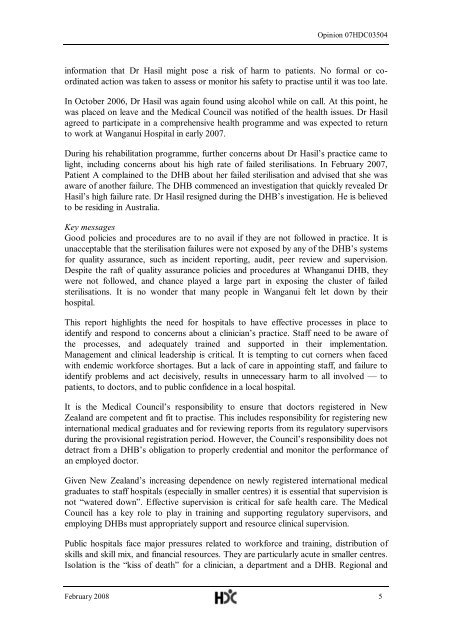Roman Hasil and the Whanganui DHB - Health and Disability ...
Roman Hasil and the Whanganui DHB - Health and Disability ...
Roman Hasil and the Whanganui DHB - Health and Disability ...
Create successful ePaper yourself
Turn your PDF publications into a flip-book with our unique Google optimized e-Paper software.
Opinion 07HDC03504<br />
information that Dr <strong>Hasil</strong> might pose a risk of harm to patients. No formal or coordinated<br />
action was taken to assess or monitor his safety to practise until it was too late.<br />
In October 2006, Dr <strong>Hasil</strong> was again found using alcohol while on call. At this point, he<br />
was placed on leave <strong>and</strong> <strong>the</strong> Medical Council was notified of <strong>the</strong> health issues. Dr <strong>Hasil</strong><br />
agreed to participate in a comprehensive health programme <strong>and</strong> was expected to return<br />
to work at Wanganui Hospital in early 2007.<br />
During his rehabilitation programme, fur<strong>the</strong>r concerns about Dr <strong>Hasil</strong>’s practice came to<br />
light, including concerns about his high rate of failed sterilisations. In February 2007,<br />
Patient A complained to <strong>the</strong> <strong>DHB</strong> about her failed sterilisation <strong>and</strong> advised that she was<br />
aware of ano<strong>the</strong>r failure. The <strong>DHB</strong> commenced an investigation that quickly revealed Dr<br />
<strong>Hasil</strong>’s high failure rate. Dr <strong>Hasil</strong> resigned during <strong>the</strong> <strong>DHB</strong>’s investigation. He is believed<br />
to be residing in Australia.<br />
Key messages<br />
Good policies <strong>and</strong> procedures are to no avail if <strong>the</strong>y are not followed in practice. It is<br />
unacceptable that <strong>the</strong> sterilisation failures were not exposed by any of <strong>the</strong> <strong>DHB</strong>’s systems<br />
for quality assurance, such as incident reporting, audit, peer review <strong>and</strong> supervision.<br />
Despite <strong>the</strong> raft of quality assurance policies <strong>and</strong> procedures at <strong>Whanganui</strong> <strong>DHB</strong>, <strong>the</strong>y<br />
were not followed, <strong>and</strong> chance played a large part in exposing <strong>the</strong> cluster of failed<br />
sterilisations. It is no wonder that many people in Wanganui felt let down by <strong>the</strong>ir<br />
hospital.<br />
This report highlights <strong>the</strong> need for hospitals to have effective processes in place to<br />
identify <strong>and</strong> respond to concerns about a clinician’s practice. Staff need to be aware of<br />
<strong>the</strong> processes, <strong>and</strong> adequately trained <strong>and</strong> supported in <strong>the</strong>ir implementation.<br />
Management <strong>and</strong> clinical leadership is critical. It is tempting to cut corners when faced<br />
with endemic workforce shortages. But a lack of care in appointing staff, <strong>and</strong> failure to<br />
identify problems <strong>and</strong> act decisively, results in unnecessary harm to all involved — to<br />
patients, to doctors, <strong>and</strong> to public confidence in a local hospital.<br />
It is <strong>the</strong> Medical Council’s responsibility to ensure that doctors registered in New<br />
Zeal<strong>and</strong> are competent <strong>and</strong> fit to practise. This includes responsibility for registering new<br />
international medical graduates <strong>and</strong> for reviewing reports from its regulatory supervisors<br />
during <strong>the</strong> provisional registration period. However, <strong>the</strong> Council’s responsibility does not<br />
detract from a <strong>DHB</strong>’s obligation to properly credential <strong>and</strong> monitor <strong>the</strong> performance of<br />
an employed doctor.<br />
Given New Zeal<strong>and</strong>’s increasing dependence on newly registered international medical<br />
graduates to staff hospitals (especially in smaller centres) it is essential that supervision is<br />
not “watered down”. Effective supervision is critical for safe health care. The Medical<br />
Council has a key role to play in training <strong>and</strong> supporting regulatory supervisors, <strong>and</strong><br />
employing <strong>DHB</strong>s must appropriately support <strong>and</strong> resource clinical supervision.<br />
Public hospitals face major pressures related to workforce <strong>and</strong> training, distribution of<br />
skills <strong>and</strong> skill mix, <strong>and</strong> financial resources. They are particularly acute in smaller centres.<br />
Isolation is <strong>the</strong> “kiss of death” for a clinician, a department <strong>and</strong> a <strong>DHB</strong>. Regional <strong>and</strong><br />
February 2008 5

















